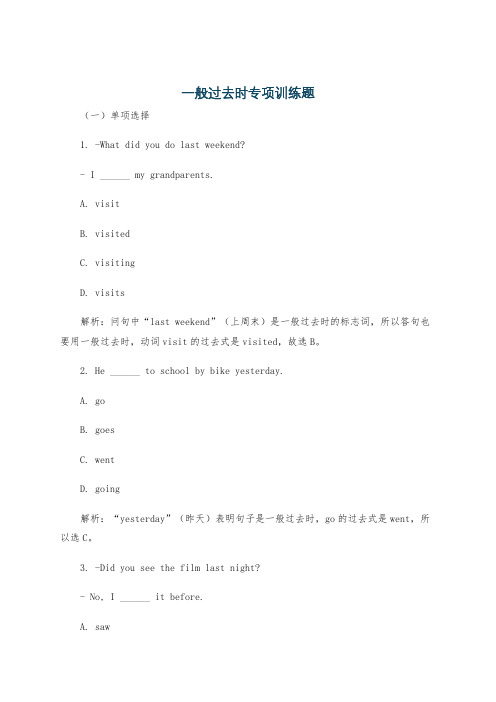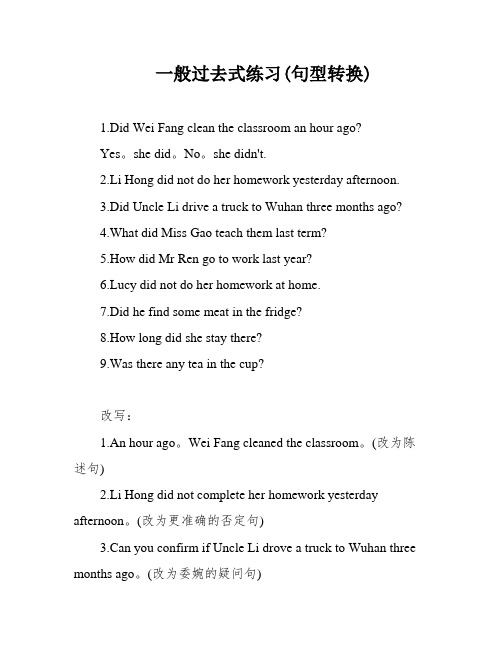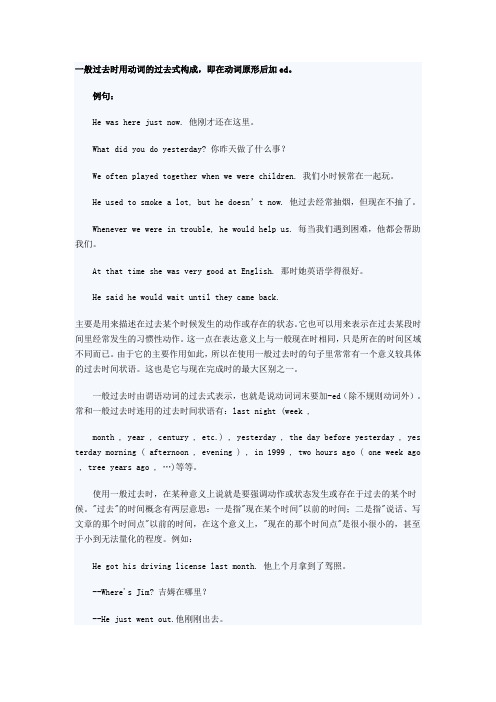过去式句型转换练习
一般过去时专项训练题

一般过去时专项训练题(一)单项选择1. -What did you do last weekend?- I ______ my grandparents.A. visitB. visitedC. visitingD. visits解析:问句中“last weekend”(上周末)是一般过去时的标志词,所以答句也要用一般过去时,动词visit的过去式是visited,故选B。
2. He ______ to school by bike yesterday.A. goB. goesC. wentD. going解析:“yesterday”(昨天)表明句子是一般过去时,go的过去式是went,所以选C。
3. -Did you see the film last night?- No, I ______ it before.A. sawB. have seenC. seeD. had seen解析:问句是一般过去时,问昨晚是否看电影了。
答句说之前就看过了,“之前看过”这个动作发生在昨晚(过去的时间)之前,是过去的过去,要用过去完成时,过去完成时结构是had + 过去分词,see的过去分词是seen,所以选D。
4. She ______ a book in the library at this time yesterday.A. readsB. readC. was readingD. is reading解析:“at this time yesterday”(昨天这个时候)表示过去某个具体时间点正在进行的动作,要用过去进行时,结构是was/were+动词 -ing形式,主语是she,所以用was reading,选C。
5. My father ______ in this factory for 20 years before he moved to another city.A. has workedB. workedC. worksD. had worked解析:“before he moved to another city”(在他搬到另一个城市之前),moved是过去式,在这个过去动作之前的工作是过去的过去,要用过去完成时,结构是had+过去分词,work的过去分词是worked,所以选D。
中考英语复习—过去式的专项练习题

英语一般过去时专项练习一、过去时练习:写出下列动词的过去式is\am_________feed_______study________are ________milk _________ play_______go________make ________do_________dance________worry________ask _____take_________eat__________ draw________ put ______have________ stop_________read_______eat________二、句型转换。
1.Tom listened to CDs yesterday.(变否定句)Tom to CDs yesterday.2.Father slept all day last Monday.(改一般疑问句)Father all day last Monday?3.I was very busy last week.(改否定句和一般疑问句)I very busy last week. you very busy last week?4.She took the wallet away from the table.(对划线部分提问)she the wallet away from?5. Last weekend, she got up very early.(对划线部分提问)she up very early?6.Jimmy read a book about history.(对划线部分提问)Jimmy ?7. Sally went to the pool yesterday. (改为一般疑问句)________ Sally ________ to the pool yesterday?8. They had a party 2 days age. (改为否定句)They ________ _________ a party 2 days ago.9. We did our homework last Friday. (改为否定句)We _________ _________ our homework.10. Her weekend was very interesting. (划线提问)_________ _________ your weekend?11. I played soccer on my computer last weekend. (划线提问)What _______ you ________ on your computer last weekend?12. Did he study English well? (改为肯定句)He _________ English well.13. It was time for lunch. (同义句)It was time _________ ________ lunch.14. He can’t see anything on the blackboard. (同义句)He can __________ __________ on the blackboard.15、He did some cleaning this morning.(对划线部分提问)he the morning?16、My weekend was very good.( 对划线部分提问)weekend?17、We went to the mountains last weekend. ( 对划线部分提问)the mountains ?18、He did his homework last night.(改为否定句)He hes homework last night.19、John went to the zoo last Saturday. (对划线部分提问)John last Saturday?20、Tom played football this afternoon. (改为否定句)Tom football this afternoon.21、Barry visited his uncle last Sunday.(改为一般疑问句)Barry his uncle last Sunday?22、They went to the beach a week ago. (对划线部分提问)did they a week ago?三、用所给动词的适当形式填空。
一般过去式练习(句型转换)

一般过去式练习(句型转换)1.Did Wei Fang clean the classroom an hour ago?Yes。
she did。
No。
she didn't.2.Li Hong did not do her homework yesterday afternoon.3.Did Uncle Li drive a truck to Wuhan three months ago?4.What did Miss Gao teach them last term?5.How did Mr Ren go to work last year?6.Lucy did not do her homework at home.7.Did he find some meat in the fridge?8.How long did she stay there?9.Was there any tea in the cup?改写:1.An hour ago。
Wei Fang cleaned the classroom。
(改为陈述句)2.Li Hong did not complete her homework yesterday afternoon。
(改为更准确的否定句)3.Can you confirm if Uncle Li drove a truck to Wuhan three months ago。
(改为委婉的疑问句)4.Miss Gao taught English to them last term。
(改为更准确的表达)5.What was Mr Ren's mode of n to work last year。
(改为更准确的提问方式)6.Lucy did not finish her homework at home。
(改为更准确的表达)7.Is it true that he discovered some meat in the fridge。
初中一般过去式练习题及答案和有关知识点

一般过去时用动词的过去式构成,即在动词原形后加ed。
例句:He was here just now. 他刚才还在这里。
What did you do yesterday? 你昨天做了什么事?We often played together when we were children. 我们小时候常在一起玩。
He used to smoke a lot, but he doesn’t now. 他过去经常抽烟,但现在不抽了。
Whenever we were in trouble, he would help us. 每当我们遇到困难,他都会帮助我们。
At that time she was very good at English. 那时她英语学得很好。
He said he would wait until they came back.主要是用来描述在过去某个时候发生的动作或存在的状态。
它也可以用来表示在过去某段时间里经常发生的习惯性动作。
这一点在表达意义上与一般现在时相同,只是所在的时间区域不同而已。
由于它的主要作用如此,所以在使用一般过去时的句子里常常有一个意义较具体的过去时间状语。
这也是它与现在完成时的最大区别之一。
一般过去时由谓语动词的过去式表示,也就是说动词词末要加-ed(除不规则动词外)。
常和一般过去时连用的过去时间状语有:last night (week ,month , year , century , etc.) , yesterday , the day before yesterday , yes terday morning ( afternoon , evening ) , in 1999 , two hours ago ( one week ago , tree years ago , …)等等。
使用一般过去时,在某种意义上说就是要强调动作或状态发生或存在于过去的某个时候。
2023年译林一般过去式知识点以及练习

一般过去时旳练习句子变化形式(一)一般过去时旳一般疑问句(1)1.把 was, were放在句首, 其他位置不变。
由Was…? 引导旳一般疑问句, 肯定答为: Yes,… was.否认回答为: No,…wasn’t;由Were…?引导旳一般疑问句, 肯定回答为: Yes,…were.否认回答为: No,…weren’t.如:She was happy yesterday.---Was she happy? Yes, she was.(肯定回答) No, She wasn’t(否认回答)(2)They were in Li Yan’s home last night.(3)---Were they in Li Yan’s home last night?-Yes, they were.(肯定回答)--No, they weren’t(否认回答)2.在行为动词旳句子中, 要用助动词did 来引导, 其他旳语序不变。
要注意旳是, 要把行为动词旳过去式改为原形。
肯定回答为: Yes,…did;否认No,…didn’t.如: John played computer games last night.---Did John play computer games last night?Yes, he did. No,he didn’t(二)一般过去时旳否认句1.在表达过去存在旳状态旳句子中, 相接在was, were旳背面加上not。
如:(1)He was in the park last Sunday.He was not in the park last Sunday.(2) We were busy last week.We were not busy last week.2.在表达过去旳时间发生旳动作旳句子中, 要在行为动词旳前面加助动词didn’t.然后把过去式旳行为动词改为动词原形。
即: didn’t+ 动词原形。
句型转换、翻译句子练习题

句型转换、翻译句子练习题句型转换、翻译句子一、句型转换涉及的动词分类:1. 情态动词:can may would will should could…2. be动词:am is are (过去式:was were)3. 助动词:do does did二、句子分类:①有情有be(句子中有情态动词或者有be动词)②无情无be(句子中既没有情态动词也没有be动词)三、有情有be类型:A. 肯定句变否定句1. This is my book. ----- This is not my book. is not = isn’t are not = aren’t2. I can sing a song. ----- I can not sing a song. can not= can’t总结口诀:有情有be变否定,情be后加not。
B. 肯定句变疑问句1. This is my book. -----Is this your book?2. I can sing a song. -----Can you sing a song?总结口诀:有情有be变疑问,情be提至句首并大写,一二人称转换,句末句号改问号。
四、无情无be类型:A. 肯定句变否定句I like to fly a kite. ----- I don't like to fly a kite.do not = don’t does not = doesn’tShe went to the cinema last night. ----- She didn’t go to the cinema last night. did not = didn’t总结口诀:无情无be变否定,借助do, does, did,do, does, did 后加not, 后面动词现原形。
B. 肯定句变疑问句I like to fly a kite.----- Do you like to fly a kite?She went to the cinema last night. ----- Did she go to the cinema last night?总结口诀:无情无be变疑问,借助do, does, did,do, does, did 提至句首并大写,一二人称转换,后面动词现原形,句末句号改问号。
动词过去式的变化_动词三人称单数练习_动词ing练习

动词的第三人称单数的单数及发音规则:1.一般直接在动词后加-s,-s在清辅音后读/s/,在浊辅音或元音后读/z/, ds 读/dz/, ts读/ts 如help -helps/s/ know -knows/z/ get -gets/s/ read -reads/z/2.以字母s, x, ch, sh或有些以o 结尾的动词加-es,-es 读/iz/, 如guess -guesses fix -fixes teach -teaches wash -washes注意:go goes/z/ do does /z/3.辅音字母+y结尾的动词,先变y为i,再加-es,-ies读/iz/carry -carries fly -flies study -studies注意:在play---plays,say----says中,字母y前为元音字母,第三人称单数形式直接在动词后加-s4.be动词的第三人称单数分别为am, is, are, have则为has注意:以不发音字母“e”结尾的开音节词,如果尾音是/s/,/z/,加-s后,字母”e”发音,与所加-s一起读作/iz/,如close closes/iz/动词的ing变化规则:1.一般情况直接加ing,如look—looking go---going visit---visiting2.以不发音的e结尾的,去e再加ing,如come---coming make---making write---writing3.以重读闭音节结尾并且只有一个辅音字母的,双写该辅音字母,再加ing,如run---running stop---stopping get---getting swim---swimming begin---beginning4.以辅音字母加y结尾的,直接加ing,如study---studying carry---carrying fly---flying cry---crying5.以ie结尾的重度开音节动词,先变ie为y,再加ing,如die---dying tie---tying lie---lying动词的过去式变化规则:1.规则变化(1)一般直接在动词后加ed,-ed在清辅音后读/t/, 在浊辅音及元音后读/d,/-ed在/t//d/后读/id/,如call---called open---opened look---looked want---wanted /id/ need---needed /id/(2)以不发音的“e”结尾的,直接加-d ,如live---lived move---moved hope---hoped(3)以辅音字母加y结尾的动词,先变y为i,再加-ed,(注意:如果是元音字母加y结尾的,还是直接加-ed,如,play---played,enjoy---enjoyed)如study---studied cry---cried try---tried(4)以一个辅音字母结尾的重读闭音节动词,双写最后一个辅音字母,再加-ed,如plan---planned fit---fitted stop---stopped2.不规则变化(要特俗记忆),以下是一些常见的动词的过去式am,is-was are-were, do-did, see-saw, say-said, give-gave, get-got,另附清辅音与浊辅音:清辅音:[p] [t] [k] [f] [s] [θ] [∫] [ts] [t∫] [tr] [h]浊辅音:[b] [d] [g] [v] [z] [δ] [з] [dz] [dз] [dr] [r]音节分为开音节和闭音节1.开音节又分为相对开音节和绝对开音节(1)相对开音节:“以一个元音字母+一个辅音字母(r除外)+不发音的e”结尾的叫相对开音节。
一般过去式句型转换

1.I bought a watermelon yesterday.(一般疑问句)2.They were young then. (否定句)3.He did his homework last Saturday.(划线部分提问)4.They visited lots of places.( 一般疑问句)5.She went shopping the day before yesterday.( 划线部分提问)6.He telephoned me again .(否定句)7.I bought a watermelon yesterday.(tomorrow)8.They were young then. (now)9.He did his homework last Saturday. (at the moment)10.H e visited lots of places last year. (every year)11.S he went shopping the day before yesterday.(on Sundays)13.The dog is eating a bone .(every day)14.She washes the dishes every day.(改为一般疑问句)15.Mary does the housework.(改为一般否定句)16.He comes from China. (对划线部分提问)17.I don’t go to work by car.(用He 做主语)18.He usually watches TV at night.(用now, listen to the radio改为现在进行时)19.They are typing the letters. (对划线部分提问)20.He can read the letter. .(改为一般疑问句)21. I can lift this table. (改为一般否定句)22.Turn on the radio.(用He做主语改为一般将来时)。
